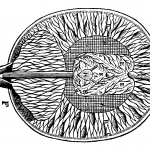
Forget Caitlyn Jenner. The National Post reports about the next big trend in nominalism:
When he cut off his right arm with a “very sharp power tool,” a man who now calls himself One Hand Jason let everyone believe it was an accident.
But he had for months tried different means of cutting and crushing the limb that never quite felt like his own, training himself on first aid so he wouldn’t bleed to death, even practicing on animal parts sourced from a butcher.
“My goal was to get the job done with no hope of reconstruction or re-attachment, and I wanted some method that I could actually bring myself to do,” he told the body modification website ModBlog.
If that wasn’t bad enough, there’s a half-baked theory behind it all decked out in the jargon of authenticity:
“We define transability as the desire or the need for a person identified as able-bodied by other people to transform his or her body to obtain a physical impairment,” says Alexandre Baril, a Quebec born academic who will present on “transability” at this week’s Congress of the Social Sciences and Humanities at the University of Ottawa.
“The person could want to become deaf, blind, amputee, paraplegic. It’s a really, really strong desire.”
But there is trouble brewing in unfettered freedom loving (read: libertarian) paradise:
“It’s a problem for individuals because it’s distressing. But lots of things are.” He suggests this is just another form of body diversity — like transgenderism — and amputation may help someone achieve similar goals as someone who, say, undergoes cosmetic surgery to look more like who they believe their ideal selves to be . . .
. . . But this has been met with great resistance in both the disability activist community and in transgender circles, argues Baril, a visiting scholar of feminist, gender and sexuality studies at Wesleyan University in Middletown, Connecticut.
“They tend to see transabled people as dishonest people, people who try to steal resources from the community, people who would be disrespectful by denying or fetishizing or romanticizing disability reality,” Baril says, adding people in both transgender and disabled circles tend to make judgmental or prejudicial statements about transabled people. “Each try to distance themselves.”
Michael Martin’s The Submerged Reality places the whole transabled ideology of choice within a wider philosophical context with roots in the nominalist thought (in short: no universals, only randomly assigned names to particulars) of William of Ockham, a 14th century Franciscan theologian:
Biotech agriculture, the redefinition of gender, and everything I have enumerated above which has contributed to the triumph of postmodern nominalism may seem to have prove the thesis of pure nature: that there is a nature unaffected by God’s grace, that God is completely transcendent, if not nonexistent. It is clear indeed, undeniable–that:
“Around 1600, the last comprehensive integration of our culture began to break down into the fragmentary syntheses of a mechanistic world picture, a classicist aesthetics, and a theological scholasticism. Soon a flat utilitarianism would be ready to serve as a midwife to the birth of what Nietzsche called modern man’s small soul” [Louis Dupre in Passage to Modernity].
Don’t lose your head over it, but this is what what is meant by the Death of God.
UPDATE: You might want to compare this phenomenon to Alasdair MacIntyre’s revelatory argument about disability and dependence.
Transability puts this scene from Monty Python and the Holy Grail in new perspective, doesn’t it?
Sidebar: I really do think Terry Eagleton’s reading of the Death of God really cuts it as a cultural analysis.
I sincerely feel deeply alienated from my empty bank account, so please remember to use the PayPal button on the upper right hand corner of this blog’s homepage. Blogging is not a lucrative enterprise despite all of its indubitable glamor and accolades. We have a car to fix, rent to pay, and I’m chronically underemployed.












